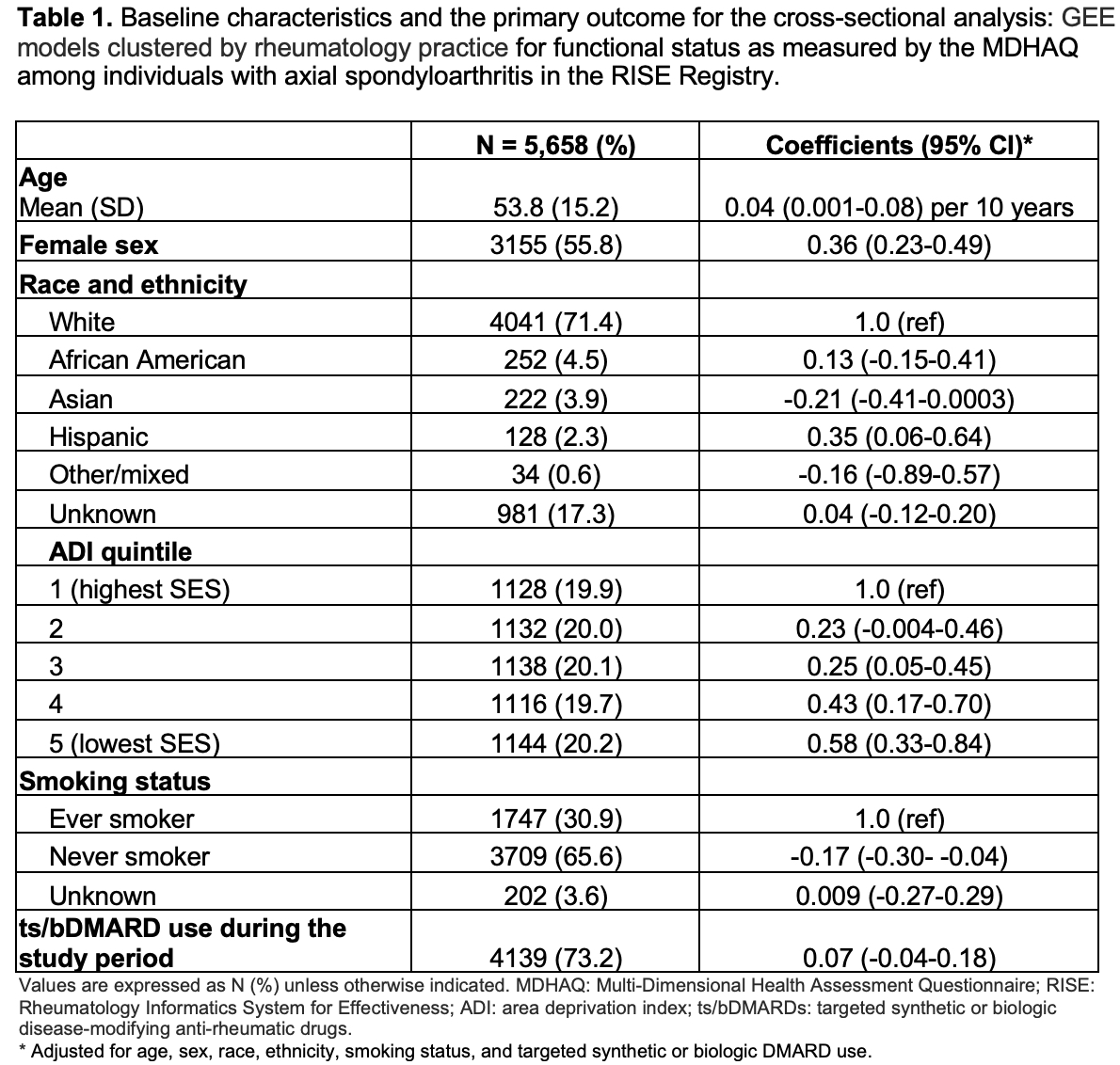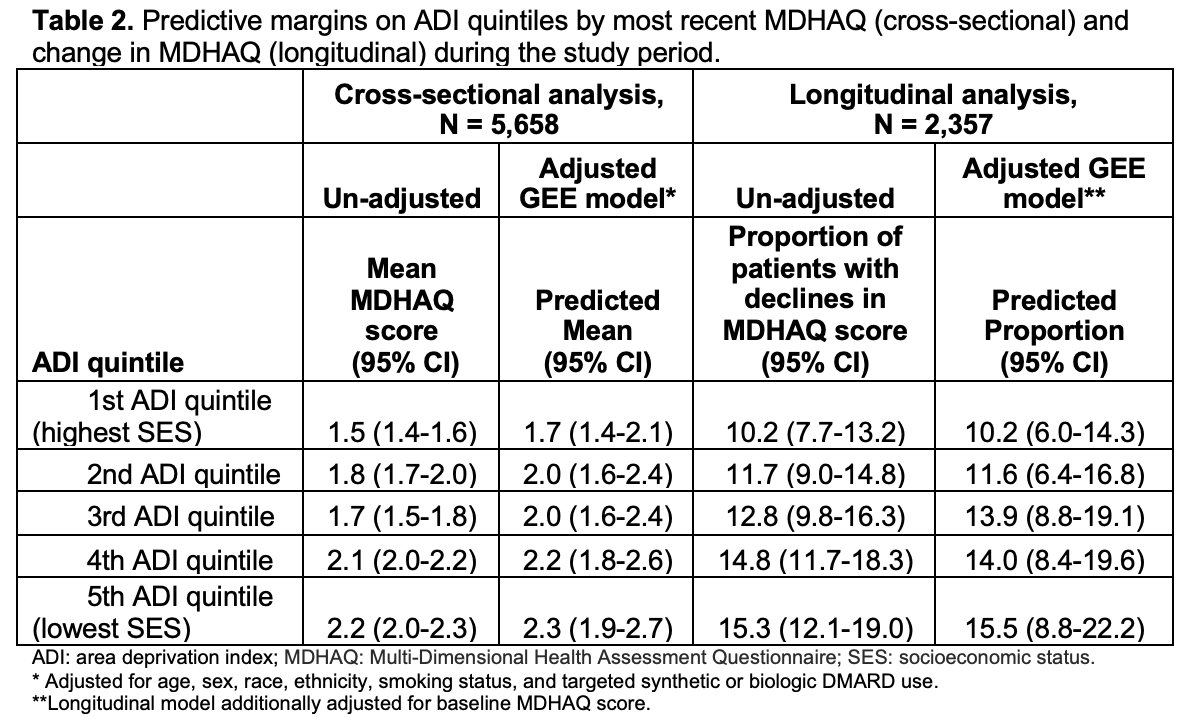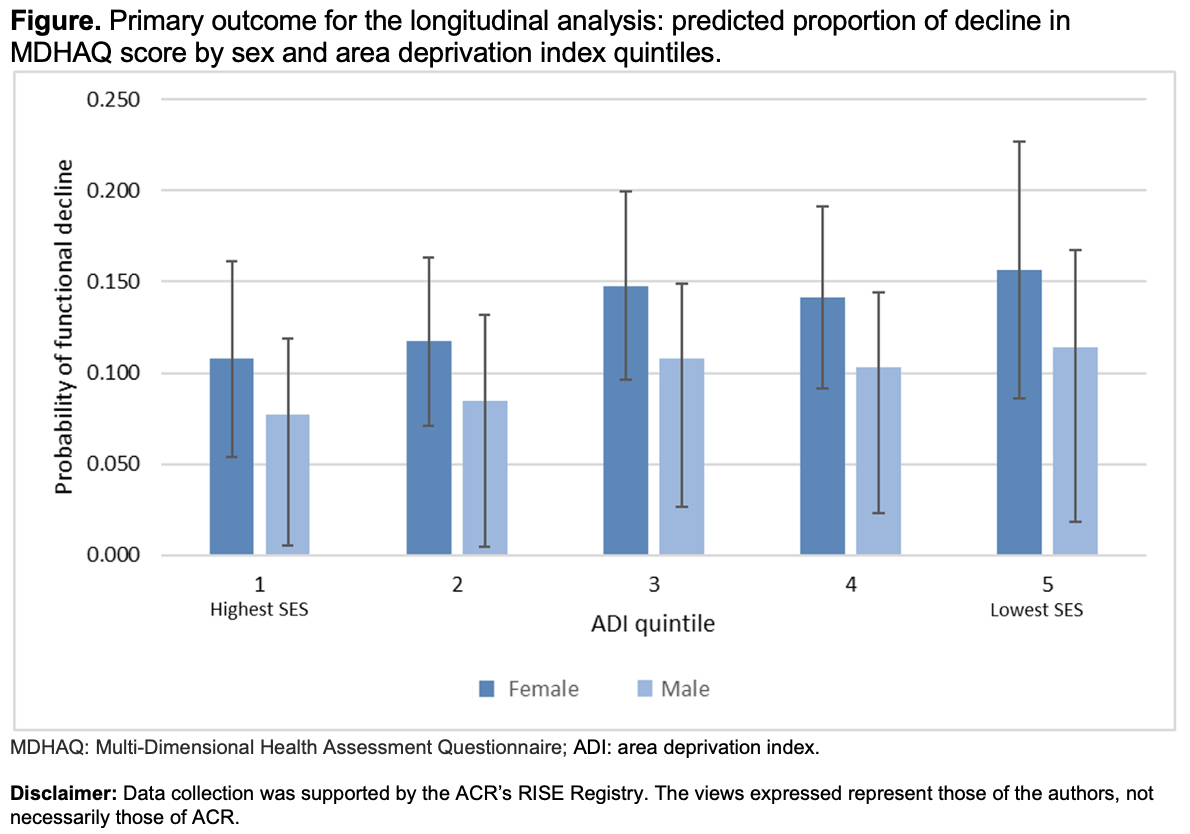Session Information
Session Type: Poster Session B
Session Time: 9:00AM-11:00AM
Background/Purpose: Women with axial spondyloarthritis (axSpA) tend to have worse patient reported outcomes compared to men. Non-U.S. studies have evaluated functional status (FS) by sex in axSpA, but data are inconsistent. Studies in other rheumatic diseases suggest that lower socioeconomic status (SES) is correlated with worse FS. Yet little is known about the effect of SES in axSpA. We evaluated FS by sex and SES in the U.S. using the Rheumatology Informatics System for Effectiveness (RISE) registry.
Methods: Data were derived from RISE, a large, national electronic health record-based registry from 2016-2022. Patients ages 18+ with ≥2 visits for axSpA or ankylosing spondylitis (AS) with a rheumatologist, ≥ 30 days apart and ≥1 FS measure (Multi-Dimensional Health Assessment Questionnaire or MDHAQ) were included. RAPID3 (of which MDHAQ is a component) has been validated in AS. Patients with HIV or cancer were excluded. Area deprivation index (ADI), a zip code-based measure for neighborhood poverty, was used as a proxy for SES. We performed cross-sectional and longitudinal analyses using GEE models in which patients were clustered within rheumatology practices, and adjusting for age, sex, race, ethnicity, ADI quintile, smoking status (ever/never), and targeted synthetic or biologic DMARD (ts/bDMARD) use (yes/no during the study period). In the cross-sectional analysis, the outcome was the most recent MDHAQ score (0-10 scale) during 2019-2022. We tested for a linear trend across ADI quintiles for MDHAQ, with and without interaction for sex. In the longitudinal analysis, the outcome was functional decline (yes/no) defined as a >1.2 point difference in MDHAQ at 2 time points (most recent MDHAQ minus the next most recent MDHAQ ≥12 months prior), adjusted for baseline MDHAQ. We reported predictive margins in both analyses.
Results: We identified 5,658 adults with axSpA for the cross-sectional analysis and 2,357 were included in the longitudinal cohort. The mean (SD) age was 53.8 years (15.2), 55.8% were female, and 71.4% were non-Hispanic White (Table 1). The mean (SD) MDHAQ score for women and men were 2.1 (2.2) and 1.6 (2.0), respectively. There was no evidence of an interaction between sex and SES on FS; instead, women had consistently lower FS than men across all ADI quintiles (Figure). In the cross-sectional analysis, the predicted mean MDHAQ score was 2.3 (95% CI 1.9-2.7) for the 5th ADI quintile (lowest SES) compared to 1.7 (95% CI 1.4-2.1) for the 1st ADI quintile (highest SES; Table 2). In the longitudinal analysis, the predicted proportion of patients with FS decline were 15.5 (95% CI 8.8-22.2) in the 5th ADI quintile compared to 10.2 (95% CI 6.0-14.3) in the 1st ADI quintile. In the longitudinal analysis, women had 1.65 (95% CI 1.3-2.14) times higher odds of functional decline compared to men.
Conclusion: In this large U.S. sample of adults with axSpA, women had worse FS than men, at baseline and over time, and FS was worse in both sexes with lower SES. Women and individuals with low SES should be prioritized for interventions to reduce FS decline and disability in AS. Future work should assess the mechanisms of SES and sex-based FS differences.
To cite this abstract in AMA style:
Stovall R, Li J, izadi z, Gensler L, Schmajuk G, Yazdany J. Functional Status by Sex and Socioeconomic Status in Axial Spondyloarthritis [abstract]. Arthritis Rheumatol. 2023; 75 (suppl 9). https://acrabstracts.org/abstract/functional-status-by-sex-and-socioeconomic-status-in-axial-spondyloarthritis/. Accessed .« Back to ACR Convergence 2023
ACR Meeting Abstracts - https://acrabstracts.org/abstract/functional-status-by-sex-and-socioeconomic-status-in-axial-spondyloarthritis/



